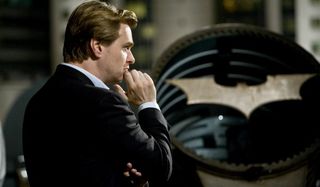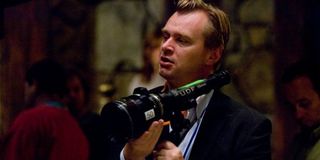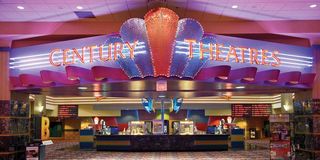Christopher Nolan's 4 Bold Predictions For The Future Of Cinema

When Christopher Nolan speaks, it makes sense that the film industry should listen.
Long before reshaping Batman’s cinematic legacy, Christopher Nolan was pioneering somber storytelling methods with twisty narratives like Memento and moody police procedurals like Insomnia. In between Batman movies, Nolan pushes the technological envelope in vast epics like Inception. And he even explores the power and presentation of IMAX in his last two Batman films, The Dark Knight and The Dark Knight Rises.
Nolan is expected to be at the forefront of the theatrical-presentation conversation when his sci-fi drama Interstellar reaches multiplexes in November. Ahead of that curve, the filmmaker took to the Wall Street Journal for a fascinating, sobering conversation about the state of modern cinema and the direction of the major studios. There’s so much to chew on regarding what Christopher Nolan had to say about this industry, and this storytelling method, that we adore. Let’s break down a few of his key points.

Movies Screenings Will Work Like Television in the Near Future
Christopher Nolan begins by talking about an industry change that is near and dear to his heart, the transition from actual film to digital projection. He mentions how it’s meant to cut down on costs. And it will. But he also determines that it reduces films to "Content," akin to footage that can be easily shared and streamed on "phones, watches, gas-station pumps or any other screen." You can hear the disdain in Nolan’s text as he imagines an audience member watching Bane (Tom Hardy) hijack an airplane on their watch. But Nolan also says that this innovation will reduce movie theaters to "just another of these ‘platforms,’ albeit with bigger screens and cupholders."
Looking even further ahead, Nolan connects the future of theater presentations to television, where audiences can dictate what screens next, or change channels. He states:
The distributor or theater owner (depending on the vital question of who controls the remote) would be able to change the content being played, instantly. A movie's Friday matinees would determine whether it even gets an evening screening, or whether the projector switches back to last week's blockbuster. This process could even be automated based on ticket sales in the interests of ‘fairness.’"
In other words, open big, or GTFO. Which speaks to Christopher Nolan’s next major point.
CINEMABLEND NEWSLETTER
Your Daily Blend of Entertainment News

Small, Unusual Films Are In Danger
If audiences, in the near future, can vote on what they want shown in the theater, then smaller films that need time to develop an audience – a word-of-mouth hit, like Jon Favreau’s Chef, for example – have even smaller chances of securing sustained theatrical runs. Nolan explains, "New approaches need time to gather support from audiences. Smaller, more unusual films would be shut out. Innovation would shift entirely to home-based entertainment, with the remaining theaters serving exclusively as gathering places for fan-based or branded-event titles."
You can almost see this shift in place already. Smaller distribution arms opt for Video-On-Demand to get their anticipated, groundbreaking movies in the hands of proper consumers. Snowpiercer just course-corrected its own release strategy, probably because it couldn’t find theater space next to four houses all showing Michael Bay’s latest Transformers movie. Still, Nolan argues that the industry can’t abolish the theatrical experience altogether, because it always will be a significant part of the moviemaking process: The act of sharing it with a crowd. "The theatrical window is to the movie business what live concerts are to the music business—and no one goes to a concert to be played an MP3 on a bare stage."

Movie Theaters Will Change… For The Better
What will that "stage" look like? Christopher Nolan believes that in order to continue luring patrons back to movie theaters – whether for "Event" films or nostalgic retro screenings – the industry is going to have to step up its game in terms of presentation. Perhaps he’s guilty of a little wishful thinking where, under the subhed "Back to the Future," Nolan writes:
The theaters of the future will be bigger and more beautiful than ever before. They will employ expensive presentation formats that cannot be accessed or reproduced in the home (such as, ironically, film prints). And they will still enjoy exclusivity, as studios relearn the tremendous economic value of the staggered release of their products."
It sounds like Nolan is reminiscing about the good old days, when a movie premiere would shut the industry down and turn the eyes of the film community to the bright lights and theatricality of a movie theater. And it’s possible that we will return to a time when movies were so massive, they warranted that level of spectacle. I’m not saying that there’s an absence of that in today’s day and age. Michael Bay, for instance, world-premiered Age of Extinction in Hong Kong, for example, and Disney routinely shuts down Hollywood Boulevard when they open a Marvel or animated movie. But Nolan adds, "The cinema of the future will depend not just on grander presentation, but on the emergence of filmmakers inventive enough to command the focused attention of a crowd for hours."
In other words, we need the next generation of Christopher Nolans, and we need them now.

Innovative Filmmakers Will Lead the Way
Christopher Nolan tries to end his column on a note of hope, saying that – as they have in the past – new and exciting storytellers will rise to the challenge to meet the need of the audience. He writes:
These new voices will emerge just as we despair that there is nothing left to be discovered. As in the early '90s, when years of bad multiplexing had soured the public on movies, and a young director named Quentin Tarantino ripped through theaters with a profound sense of cinema's past and an instinct for reclaiming cinema's rightful place at the head of popular culture."
Nolan notes that the movie industry, over the course of its illustrious history, has always relied on mavericks to tear down the system, start over, build it back up in new ways, and reset the status quo. The 1970s, early 2000s and, some might argue, now, are periods marked by innovation and change. Directors like Alfonso Cuaron, Guillermo Del Toro, Nicholas Winding Refn, Paul Greengrass, Juan Antonio Bayona and, yes, the old guard of Tarantino, Spielberg and Scorsese are trying to reinvent the wheel as the industry shapes and molds to the desires of the audience. And that, more than anything, drives Nolan’s column. He concludes, "It's unthinkable that extraordinary new work won't emerge from such an open structure. That's the part I can't wait for."
We couldn’t agree more.

Sean O’Connell is a journalist and CinemaBlend’s Managing Editor. Having been with the site since 2011, Sean interviewed myriad directors, actors and producers, and created ReelBlend, which he proudly cohosts with Jake Hamilton and Kevin McCarthy. And he's the author of RELEASE THE SNYDER CUT, the Spider-Man history book WITH GREAT POWER, and an upcoming book about Bruce Willis.
Most Popular





